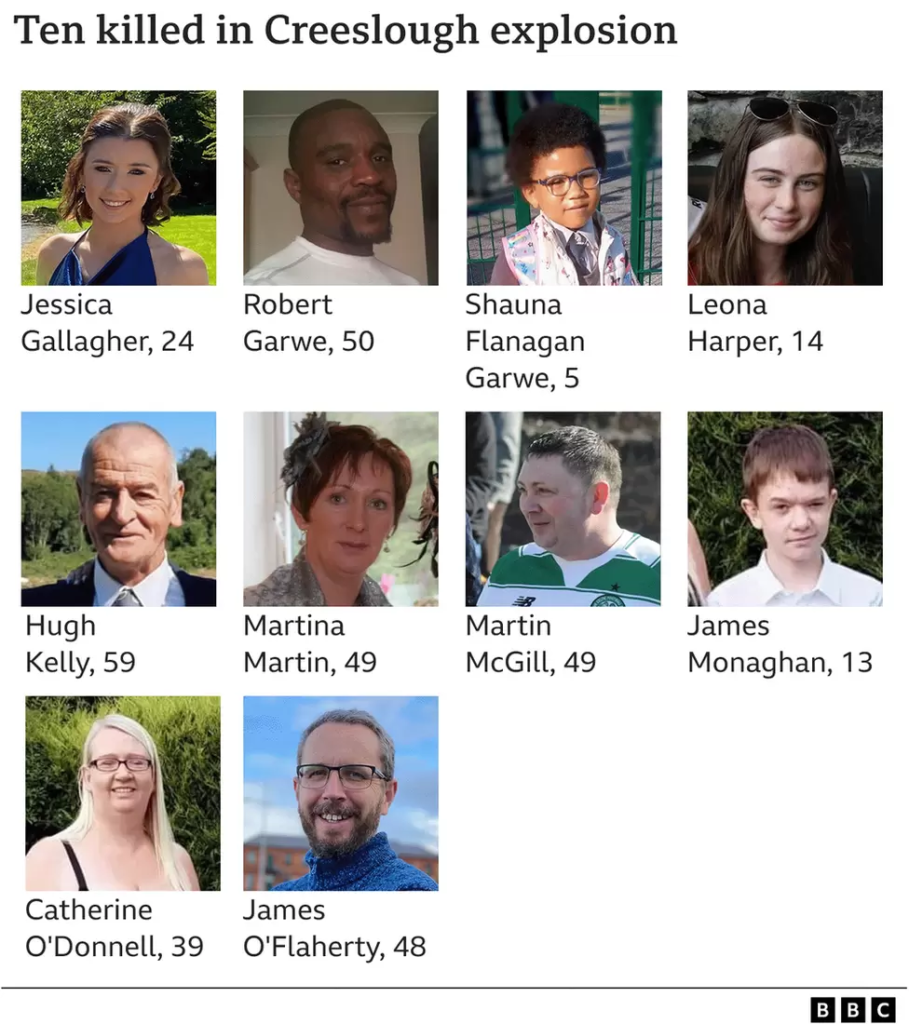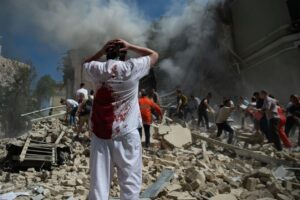A claim that some paramedics could not cross the Irish border to assist in a deadly explosion because of visa issues has been rejected by Northern Ireland ambulance officials.
The blast in Creeslough, County Donegal, last year killed 10 people.
Irish Senator Emer Currie claimed some Londonderry-based crews could not go because “some paramedics did not have the necessary visas”.
She was speaking at the British-Irish Parliamentary Assembly on Tuesday.
However, the Northern Ireland Ambulance Service (NIAS) said the service totally refutes the allegations and said “that no NIAS staff were prevented in crossing the border for any reason”.
They added that the ambulance service responded immediately and in large numbers to the blast, which had been declared as a major incident.
Ms Currie, a Fine Gael politician, had previously told the assembly that issues with the Common Travel Area (CTA) had prevented some paramedics from going to Creeslough.
The CTA is an agreement between the Republic of Ireland and the United Kingdom, which allows UK and Irish citizens to travel freely into each other’s countries.
However, those rights do not extend to migrants living on either side of the border, even if they hold lawful residency.
The Department of Justice states that any non-European Economic Area national must have a valid Irish visa before they seek to enter the Republic of Ireland, including crossing the land border.
Having permission to reside in the UK does not remove this requirement.

The victims – four men, three women, two teenagers and a five-year-old girl – were from the village or nearby area.
Creeslough is in the north west of Ireland, about 15 miles (24km) from Letterkenny and 30 miles (48km) from the border with Northern Ireland. It has a population of about 400 people.
Emergency services from Northern Ireland assisted in the incident, including fire crews, search and rescue teams and the air ambulance.
Gardaí (Irish police) have said that the investigation into the explosion is still ongoing and the cause is not yet known.
‘Tragedy on top of tragedy’
Speaking earlier, Ms Currie told BBC Radio Foyle’s The North West Today that the British-Irish Parliamentary Assembly looks exclusively at issues that arise between the two parliaments.
“As part of that we have been looking at the Common Travel Area and protecting it post-Brexit,” she said.
“One of the issues we came across was on the day of the Creeslough tragedy were there were people with visas working on the ambulances in critical care and they were concerned about crossing the border.
“That is because, according to their visas, they need to apply to cross the border so there was major concern about responding to the tragedy in the way we want.
“It was one of those moments where we have to stand back and say this isn’t on, this has to change.
“It was a tragedy on top of a tragedy, really, that there were people who felt they couldn’t respond to an emergency because their visas were holding them back.”
Director of the North West Migrants Forum, Lilian Seenoi Barr said it “is very clear that healthcare professionals based in Derry who require Irish visas cannot cross the border without a visa”.
“Having spoken to people involved, this is a recurring issue and would have been during the Creeslough tragedy,” she said.
However, Ms Seenoi Barr said it did not mean ambulance personnel were unable to fully respond to the tragedy with other staff.
‘Not affected in any way’
In response to Ms Currie’s comments, an NIAS spokesperson said their response to the incident in Creeslough “was not affected in any way due to border or visa issues”.
“No NIAS staff were prevented in crossing the border for any reason and we are deeply concerned at any reports suggesting this,” the spokesperson said.
They said they received an emergency call for assistance from the National Ambulance Service (NAS) in Donegal on Friday 7 October 2022 and “immediately dispatched a range of resources”.
This included the air ambulance with helicopter emergency medical team, hazardous area response team (HART) ambulance officers, paramedics and emergency medical technicians as well as non-emergency transport crews.
They said a “memorandum of understanding” is in place between NIAS and NAS to provide for cross-border assistance in a declared major incident.
NIAS said this is to help in the management and resourcing of emergency and urgent calls, and cross-border assistance.
“As part of our preparation for EU Exit, NIAS identified a very small number of our staff who were non-EU nationals and worked with them in regards to the necessary legislation to continue to work unhindered,” they said.
‘Drew on evidence’
A British-Irish Parliamentary Assembly spokesman said Ms Currie had been reflecting the content of a report into the Common Travel Area by its Committee on Sovereign Matters .
“An anecdote was given to the committee in oral and in written evidence,” the spokesman added, in relation to the explosion at Creeslough
He added: “The committee was told that there had been an instance where paramedics had not been able to attend the site of the Creeslough tragedy as a result of not having an Irish work visa”.
The spokesman said its committee “in turn drew on the evidence available to committee members”. The assembly, he said, wished to place on record its appreciation to all ambulance services and other emergency services that attended the Creeslough tragedy.
Source : BBC
















